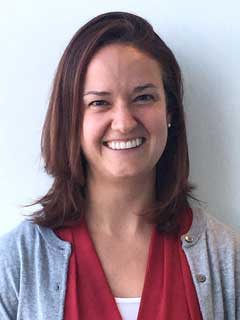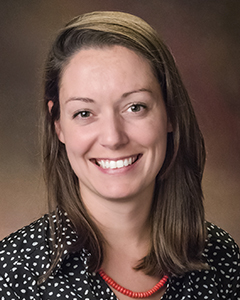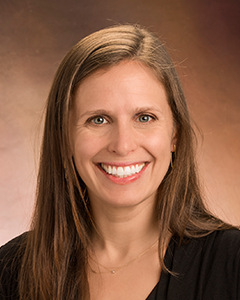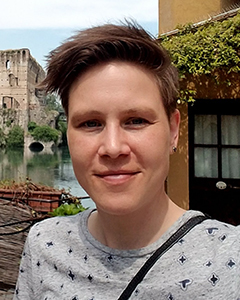HOW CAN WE HELP YOU? Call 1-800-TRY-CHOP
In This Section
STAT Madness, Autistic Adolescents, Invasive Candidiasis, Allergen Label Warnings, ASH 2022 Scholar Awards

mccannn [at] chop.edu (By Nancy McCann)
This month not only brings March Madness to basketball fans, but also STAT Madness to science fans. Check out this week's research headlines to discover which Children's Hospital of Philadelphia research teams are in the tournament for most exciting biomedical discovery of 2021. Read on to learn about the necessity of allergen label warnings for sesame ingredients, and who among us received the prestigious American Society of Hematology 2022 Scholar Award. More news covers a study on provider guidance for autistic adolescents, and two other studies assessed tests and antifungal therapy options for the diagnosis and initial treatment of invasive candidiasis.
March STAT Madness Tournament — In Search of Most Exciting Biomedical Discovery
March STAT Madness is here, and we're proud to say two CHOP research teams are contenders in the bracket-style tournament to choose 2021's best innovations in science and medicine. Competing for the title are 64 teams (selected from 100 entrants) from colleges, universities, and institutions across the United States who published exemplary biomedical research in 2021. The CHOP teams are:
- New Hope for CAR T

John Maris, MD
John Maris, MD, a lifelong neuroblastoma physician-scientist, and Mark Yarmarkovich, PhD, investigator in the Maris Lab, developed the peptide-centric chimeric antigen receptor T cell (PC-CAR). Born out of a multi-omics approach and genetic engineering, this new type of CAR — which is the key component in CAR T-cell therapy for cancer — is a turning point for treating solid tumors like neuroblastoma, one of the most aggressive pediatric cancers. They found the new therapy led to complete tumor regression in mouse models. Learn more about this breakthrough research in Cornerstone.
- Gene Therapy Dimmer Switch

Beverly Davidson, PhD
CHOP scientists, led by Beverly Davidson, PhD, director of the Raymond G. Perelman Center for Cellular and Molecular Therapeutics and Chief Scientific Strategy Officer at CHOP, created a delivery system, called the Xon system, to fine-tune levels of gene therapy expression — a "dimmer switch" that advances precision medicine for common, rare, and complex conditions. The "switch" turns on, then dims down the protein expression of a gene therapy over time to prevent toxicity. The amount of the therapeutic protein is controlled by the dose of a small-molecule drug taken by mouth. CHOP has licensed the technology to Novartis. Learn more about the novel "dimmer switch" research in this Cornerstone article.
The first round of voting closes March 7, so visit the site soon to cast your vote for our CHOP teams. Voting will continue through six single-elimination rounds before the winner is announced April 4.
Study Looks at Provider Guidance of Transition to Adulthood for Autistic Adolescents

Rachel Myers, PhD, MS
CHOP researchers, including Rachel Myers, PhD, MS, with the Center for Injury Research and Prevention, surveyed healthcare providers to determine the extent to which they discuss transition-to-adulthood topics with autistic patients without intellectual disabilities. Study results, published in the Journal of Adolescent Health, revealed that providers initiated transition-related conversations at a median age of 16 years, with over half reporting they were only "somewhat" or "a little" comfortable with discussions. Nearly all providers discussed at least one healthcare, well-being, and mental health topic, while basic need-related discussions were limited.
"Our results suggest providers may delay providing anticipatory guidance to autistic patients for transition to adulthood," noted Dr. Myers, first author of the study. "Future efforts to enhance the availability of resources and tools to support providers are essential to meeting autistic patients' and families' needs."
To learn more, see Dr. Myers' article in Research in Action, CIRP's official blog.
CHOP Researchers Wth International Pediatric Fungal Network Assess Tests and Treatment
The International Pediatric Fungal Network, a collaborative group focused on pediatric invasive fungal infections of which CHOP is a lead network site, conducted two studies that assessed a variety of diagnostic tests as well as antifungal therapy options for the diagnosis and initial treatment of invasive candidiasis, a yeast infection that can be life-threatening for children and adolescents.
The first study focused on improving the time to detection of invasive candidiasis in pediatric patients by assessing the utility of certain fungal biomarkers. The research team analyzed the utility of four commercially available fungal biomarkers in pediatric patients between 4 months and 18 years of age at risk for invasive candidiasis. Of the four tests, the researchers found that T2Candida alone or in combination with Platelia Candida Ag Plus provided the most reliable rapid detection of Candida species in children with concern for invasive candidiasis. Clinical Infectious Diseases published the findings.
In the second study, CHOP researchers compared echinocandins to triazoles or amphotericin B formulations (triazole/amphotericin B) as the initial treatment for invasive candidiasis. Analyzing patients between the ages of 4 months and 18 years, the researchers included 541 participants in the study who had been diagnosed with invasive candidiasis between 2014 and 2017. Of those patients, 235 received an echinocandin as initial therapy and 306 were in the triazoles/amphotericin B group.
The findings, published in Journal of the Pediatric Infectious Diseases Society, showed that initial directed therapy with an echinocandin was associated with reduced failure rate at 14 days but not 30 days, suggesting echinocandins may be preferable as initial directed therapy for invasive candidiasis in children and adolescents.

Brian Fisher, DO, MPH, MSCE
"Together, these studies provide data on diagnosis and treatment of pediatric patients with invasive candidiasis, which will hopefully lead to evidence-based guidelines specific to children and adolescents," said first author of both studies Brian Fisher, DO, MPH, MSCE, attending physician in the Division of Infectious Diseases and associate chair of Research for the Department of Pediatrics at CHOP.
Learn more about the International Pediatric Fungal Network.
Research Highlights Necessity of Allergen Label Warnings for Sesame Ingredients
Researchers in the Division of Allergy and Immunology set out to describe allergic reactions associated with accidental oral exposure to sesame and the role of product labeling, working with the Center for Science in the Public Interest to develop a questionnaire and disseminate the survey to online communities focused on sesame allergy. The study results were published in Annals of Allergy, Asthma & Immunology.
A total of 360 clinical reactions related to sesame were reviewed in 327 individuals. Anaphylaxis occurred in close to 69% of reactions. Hospitalization occurred in nearly 48% of events, and epinephrine was administered in 36% of cases. Events involving a packaged food product occurred in almost 68% of adverse events, with only 43% of these using the term "sesame." An alternative name, most often "tahini," was noted in 46% of products that did not include "sesame" on labeling.

Katie Kennedy, MD
"We determined considerable sesame food allergy morbidity, in part owing to inconsistent allergen labeling," noted the authors, including senior author Katie Kennedy, MD, an allergist at CHOP. "Our findings support the development of a more rapid process for the Food and Drug Administration to update the major allergen list and formulation of an improved system for reporting adverse events related to foods."
Two CHOP Docs Receive American Society of Hematology 2022 Scholar Awards
Congratulations go out to two of our up-and-coming researchers, as they are recipients of The American Society of Hematology (ASH) 2022 Scholar Awards, one of ASH's most prestigious research award programs. The Scholar Awards support fellows and junior faculty in the United States and Canada dedicated to careers in hematology research as they transition from training programs to careers as independent investigators. Funds are provided to hematologists who conduct basic, translational, and clinical research that furthers the understanding and treatment of blood disorders.
Caitlin Elgarten, MD, of CHOP's Cancer Center, received her award in the Clinical Fellow category for her study of longitudinal microbiome change over the course of stem cell transplantation (SCT).

Caitlin Elgarten, MD
"I am honored to receive an ASH Scholar Award, which will allow me to use longitudinal modeling to further define the relationship between microbiome disruption and immunologic outcomes of SCT, laying the foundation for identification of novel biomarkers and the rational design of interventions to improve SCT outcomes," Dr. Elgarten said. "I am hopeful that this award will launch me on a trajectory toward becoming an independent clinician-scientist studying bidirectional and dependent relationship between immunologic and infectious complications of SCT."
Simone Riedel, PhD, a scientist in the Bernt Lab, was among the Basic/Translational Fellow to Faculty Award recipients for her work on the mechanism of how the overexpression of the intrinsically disordered protein MN1 causes acute myeloid leukemia (AML) and regulates differentiation.

Simone Riedel, PhD
"I am happy and honored to be awarded this grant. I want to thank my mentor Dr. Kathrin Bernt and the whole lab for helping me achieve this milestone in my career," Dr. Riedel said. "This will have an immensely positive impact on my next step to become an independent scientist. It will allow me to dive deeper into the topic of how intrinsically disordered proteins influence transcription and chromatin organization. We will investigate this mechanism in the context of the highly aggressive subtype of MN1-translocated AML. This subgroup is lacking any targeted therapies, so far. Thus, understanding the basic mechanism behind this AML will hopefully allow us to identify specific targets that may lead to better therapies and outcomes."
For more information see this ASH press release.
ICYMI
Catch up on our headlines from our Feb. 18 In the News:
- CHOP Tops Forbes Ranking of America's Best Large Employers
- Madeline Bell Talks Cancer Research in Philadelphia Inquirer
- Masks Mandates Associated With Reduction in County-level COVID-19 Case Incidence Early in Pandemic
- Dollar-For-Dollar Matching Gift Campaign Will Fund New Discoveries to Transform Personalized Pediatric Surgical Care
- CHOP Researchers Use Deep Learning to Find Genetic Causes of Mental Health Disorders in African American Population
Keep up with our news, stories, and updates in real time by following us on Twitter, Facebook, LinkedIn, or Instagram. Or subscribe to our newsletter, Research Insider, to get an email sent every other Friday by signing up here.

